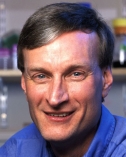explore and connect
InterViews:
» By Last Name
» By Subject
» About the Series
InterViews
 David C. Page
David C. Page
medical genetics
(recorded in 2008)
Listen or download interview (mp3, 26 minutes, 25MB)
 Subscribe directly through iTunes
Subscribe directly through iTunes
When he left Pennsylvania Dutch country to attend Swarthmore College outside Philadelphia, David Page became the first person in his family to go to college. It was the first of many “firsts” for this MacArthur Fellow and pioneering researcher. He went on to make the first maps of the Y chromosome, discover the portion of the Y chromosome that determines whether a person is born male or female and explore the role the chromosome plays in disease and male infertility.
Page began his relationship with the Y partly by chance. While on a leave of absence from medical school, he went to work on what would later become the Human Genome Project. There he was charged with analyzing bits of DNA, and his toothpick happened to land on a piece of the Y chromosome. Although the Y marks the difference between men and women—men have an X and a Y in each cell of their bodies, while women carry an XX pair—it was long dismissed as genetic junk. But Page’s dedication to it over the next 20 years revealed a rich genetic world no one had seen before.
Page is currently a professor of biology at the Massachusetts Institute of Technology and the director of the Whitehead Institute. He was elected to the National Academy of Sciences in 2005.
Interview Highlights
David Page describes growing up in rural Pennsylvania, in a town so tiny it didn’t appear on maps. He attributes his scientific inclinations to his chemistry set and Sputnik, the Soviet satellite whose 1957 launch inspired the U.S. to invest in science education, even in rural schools like Page’s. But he first comes to know what a science career entails while working on a summer research project as a student at Swarthmore. He discusses the thrill he felt at being “the first to know something”—a thrill he says has sustained him since.Last Updated: 05-14-2009
Chance and curiosity soon lead him to the Y chromosome and research into the DNA of XX men and XY women. He discusses the media hoopla surrounding his discovery of the specific gene that determines sex—a discovery disproved by later researchers. Despite his difficulties with the attention, he sticks with the Y chromosome and soon finds unique, previously unknown structures there that control sperm production and appear to play a role in male fertility. He concludes with a discussion of the future implications of his research for disease and infertility, and his thoughts on science as a creative journey.
Visit the NAS member directory for current information on David C. Page.
The audio files linked above are part of the National Academy of Sciences InterViews series. Opinions and statements included in these audio files are those of the interviewee and do not necessarily reflect the views of the National Academy of Sciences.

